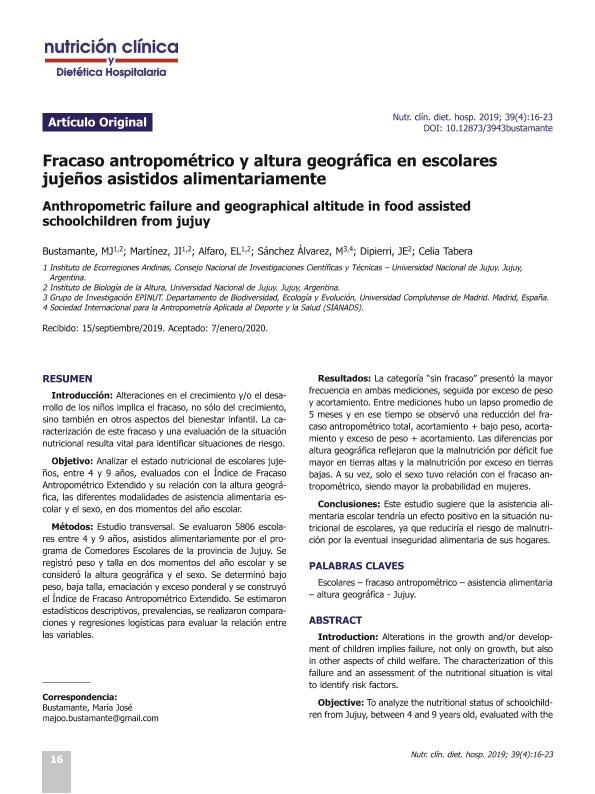Artículo
Introducción: Alteraciones en el crecimiento y/o el desarrollo de los niños implica el fracaso, no sólo del crecimiento, sino también en otros aspectos del bienestar infantil. La caracterización de este fracaso y una evaluación de la situación nutricional resulta vital para identificar situaciones de riesgo. Objetivo: Analizar el estado nutricional de escolares jujeños, entre 4 y 9 años, evaluados con el Índice de Fracaso Antropométrico Extendido y su relación con la altura geográfica, las diferentes modalidades de asistencia alimentaria escolar y el sexo, en dos momentos del año escolar. Métodos: Estudio transversal. Se evaluaron 5806 escolares entre 4 y 9 años, asistidos alimentariamente por el programa de Comedores Escolares de la provincia de Jujuy. Se registró peso y talla en dos momentos del año escolar y se consideró la altura geográfica y el sexo. Se determinó bajo peso, baja talla, emaciación y exceso ponderal y se construyó el Índice de Fracaso Antropométrico Extendido. Se estimaron estadísticos descriptivos, prevalencias, se realizaron comparaciones y regresiones logísticas para evaluar la relación entre las variables. Resultados: La categoría "sin fracaso" presentó la mayor frecuencia en ambas mediciones, seguida por exceso de peso y acortamiento. Entre mediciones hubo un lapso promedio de 5 meses y en ese tiempo se observó una reducción del fracaso antropométrico total, acortamiento + bajo peso, acortamiento y exceso de peso + acortamiento. Las diferencias por altura geográfica reflejaron que la malnutrición por déficit fue mayor en tierras altas y la malnutrición por exceso en tierras bajas. A su vez, solo el sexo tuvo relación con el fracaso antropométrico, siendo mayor la probabilidad en mujeres. Conclusiones: Este estudio sugiere que la asistencia alimentaria escolar tendría un efecto positivo en la situación nutricional de escolares, ya que reduciría el riesgo de malnutrición por la eventual inseguridad alimentaria de sus hogares. Introduction: Alterations in the growth and/or development of children implies failure, not only on growth, but also in other aspects of child welfare. The characterization of this failure and an assessment of the nutritional situation is vital to identify risk factors. Objective: To analyze the nutritional status of schoolchildren from Jujuy, between 4 and 9 years old, evaluated with the Extended Anthropometric Failure Index and its relationship with geographical altitude, the different modalities of school food assistance and sex, in two moments of the school year Methods: Cross-sectional study. 5806 schoolchildren from Jujuy between 4 and 9 years old were evaluated, food-assisted by the School Dining Program in the province of Jujuy. Weight and height were recorded at two times of the school year and geographic height and gender were considered. Underweight, stunting, wasting and weight excess were determined and the Extended Anthropometric Failure Index was constructed. Descriptive statistics and prevalence were estimated. Comparisons and logistic regressions were made to assess the relationship between the variables. Results: The “no failure” category presented the highest frequency in both measurements, followed by excess weight and stunting. Between measurements there was an average span of 5 months and at that time a reduction in total anthropometric failure, stunting + underweight, stunting and excess weight + stunting was observed. Differences in geographical altitude reflected that deficit malnutrition was higher in the highlands and malnutrition due to excess in the lowlands. In turn, only sex was related to anthropometric failure, being the probability higher in women. Conclusions: This study suggests that school food assistance would have a positive effect on the nutritional status of schoolchildren, since it would reduce the risk of malnutrition due to eventual food insecurity in their homes
Fracaso antropométrico y altura geográfica en escolares jujeños asistidos alimentariamente
Título:
Anthropometric failure and geographical altitude in food assisted schoolchildren from Jujuy
Bustamante, María José ; Martinez, Jorge Ivan
; Martinez, Jorge Ivan ; Alfaro Gómez, Emma Laura
; Alfaro Gómez, Emma Laura ; Sánchez Alvarez, María Josefina; Dipierri, Jose Edgardo; Tabera, Celia
; Sánchez Alvarez, María Josefina; Dipierri, Jose Edgardo; Tabera, Celia
 ; Martinez, Jorge Ivan
; Martinez, Jorge Ivan ; Alfaro Gómez, Emma Laura
; Alfaro Gómez, Emma Laura ; Sánchez Alvarez, María Josefina; Dipierri, Jose Edgardo; Tabera, Celia
; Sánchez Alvarez, María Josefina; Dipierri, Jose Edgardo; Tabera, Celia
Fecha de publicación:
01/2020
Editorial:
Fundación Alimentación Saludable
Revista:
Nutrición Clínica y Dietética Hospitalaria
ISSN:
1989-208X
Idioma:
Español
Tipo de recurso:
Artículo publicado
Clasificación temática:
Resumen
Archivos asociados
Licencia
Identificadores
Colecciones
Articulos(INECOA)
Articulos de INSTITUTO DE ECORREGIONES ANDINAS
Articulos de INSTITUTO DE ECORREGIONES ANDINAS
Citación
Bustamante, María José; Martinez, Jorge Ivan; Alfaro Gómez, Emma Laura; Sánchez Alvarez, María Josefina; Dipierri, Jose Edgardo; et al.; Fracaso antropométrico y altura geográfica en escolares jujeños asistidos alimentariamente; Fundación Alimentación Saludable; Nutrición Clínica y Dietética Hospitalaria; 39; 4; 1-2020; 16-23
Compartir
Altmétricas



